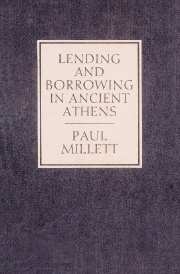Book contents
- Frontmatter
- Contents
- Preface
- I Approaches to lending and borrowing
- II The ideology of lending and borrowing
- III Borrowing and repayment
- IV The rôle of interest
- V Philia and friendship
- VI Non-professional lending: loans without interest
- VII Non-professional lending: loans bearing interest
- VIII Professional money-lending
- IX Conclusion
- Appendices
- Notes
- Bibliography
- Index of passages cited
- Index of papyri
- Index of inscriptions
- General index
- Frontmatter
- Contents
- Preface
- I Approaches to lending and borrowing
- II The ideology of lending and borrowing
- III Borrowing and repayment
- IV The rôle of interest
- V Philia and friendship
- VI Non-professional lending: loans without interest
- VII Non-professional lending: loans bearing interest
- VIII Professional money-lending
- IX Conclusion
- Appendices
- Notes
- Bibliography
- Index of passages cited
- Index of papyri
- Index of inscriptions
- General index
Summary
Neither a borrower, nor a lender be;
For loan oft loses both itself and friend,
And borrowing dulls the edge of husbandry.
Polonius' advice to his son survives as a proverbial reminder of conventional wisdom about personal borrowing. The mood is unfailingly negative. ‘He who goes a-borrowing goes a-sorrowing.’ ‘He that borrows must pay again with shame and loss.’ ‘Better to go to bed supperless than to rise in debt.’ ‘Out of debt, out of danger.’ Debt is popularly conceived as disruptive of relationships, morally reprehensible and economically damaging. From the mass of corroborative literature from Shakespeare's time onwards, one might single out Samuel Johnson's repeated and Polonius-like warnings to Boswell about the danger of borrowing: ‘Let it be your first care not to be in any man's debt’ (1791: iv, 154). From the nineteenth century, a recurring theme in art and literature is the awful spectre of insolvency: what Carlyle writing in Past and Present (almost) called ‘the Hell of the English’ (Weiss 1986: 13). The combination of folk wisdom with Victorian melodrama may sound like voices from the past; but there are those who would interpret the unacceptable face of the credit explosion in the late 1980s as the penalty for neglecting Victorian values.
What has emerged from this study of credit in Athens is the existence of another, more positive side to the lender–debtor relationship. The Athenians were keenly aware of the unpleasant possibilities of debt (see above, p. 5), but they would have looked askance at Polonius' denunciation of lending and borrowing as dangerous to friendship and best avoided.
- Type
- Chapter
- Information
- Lending and Borrowing in Ancient Athens , pp. 218 - 221Publisher: Cambridge University PressPrint publication year: 1991



